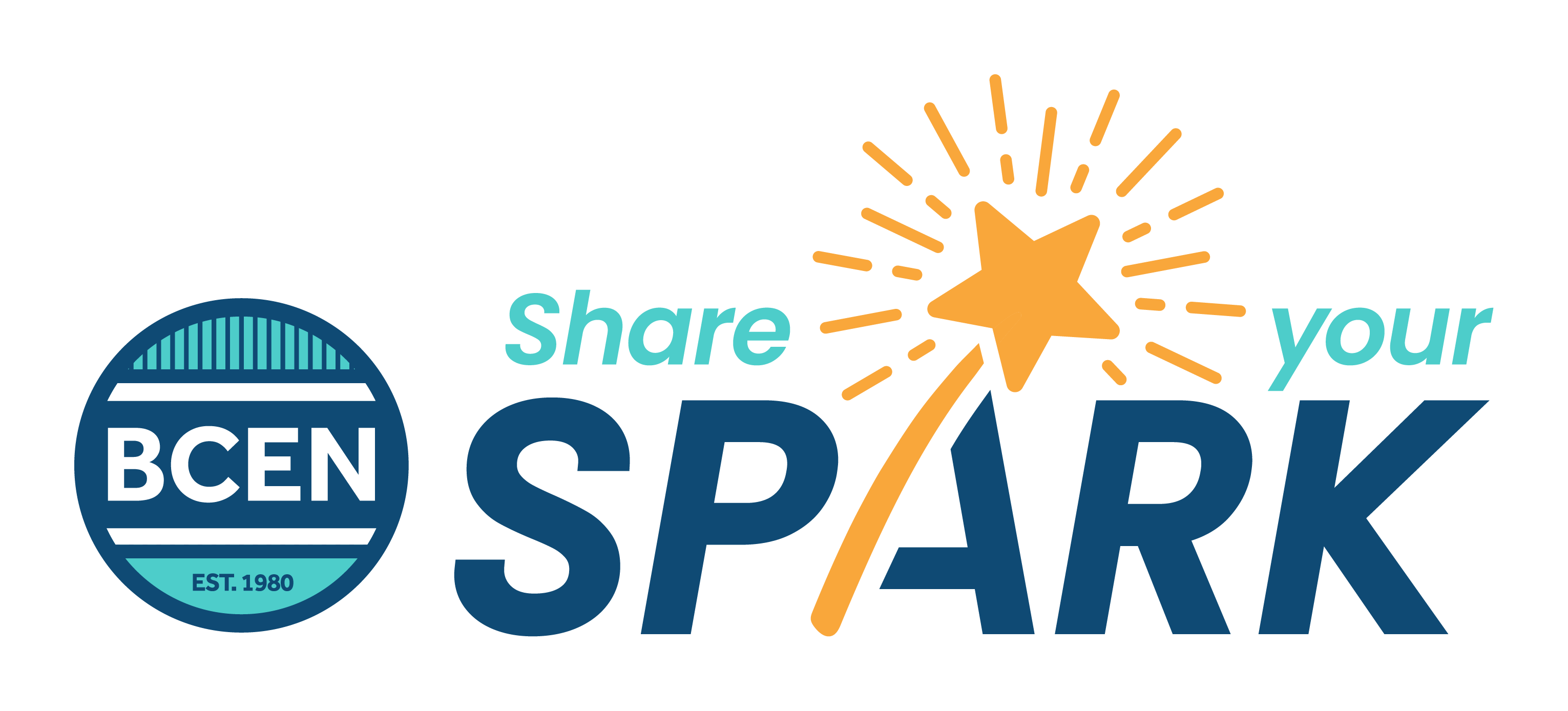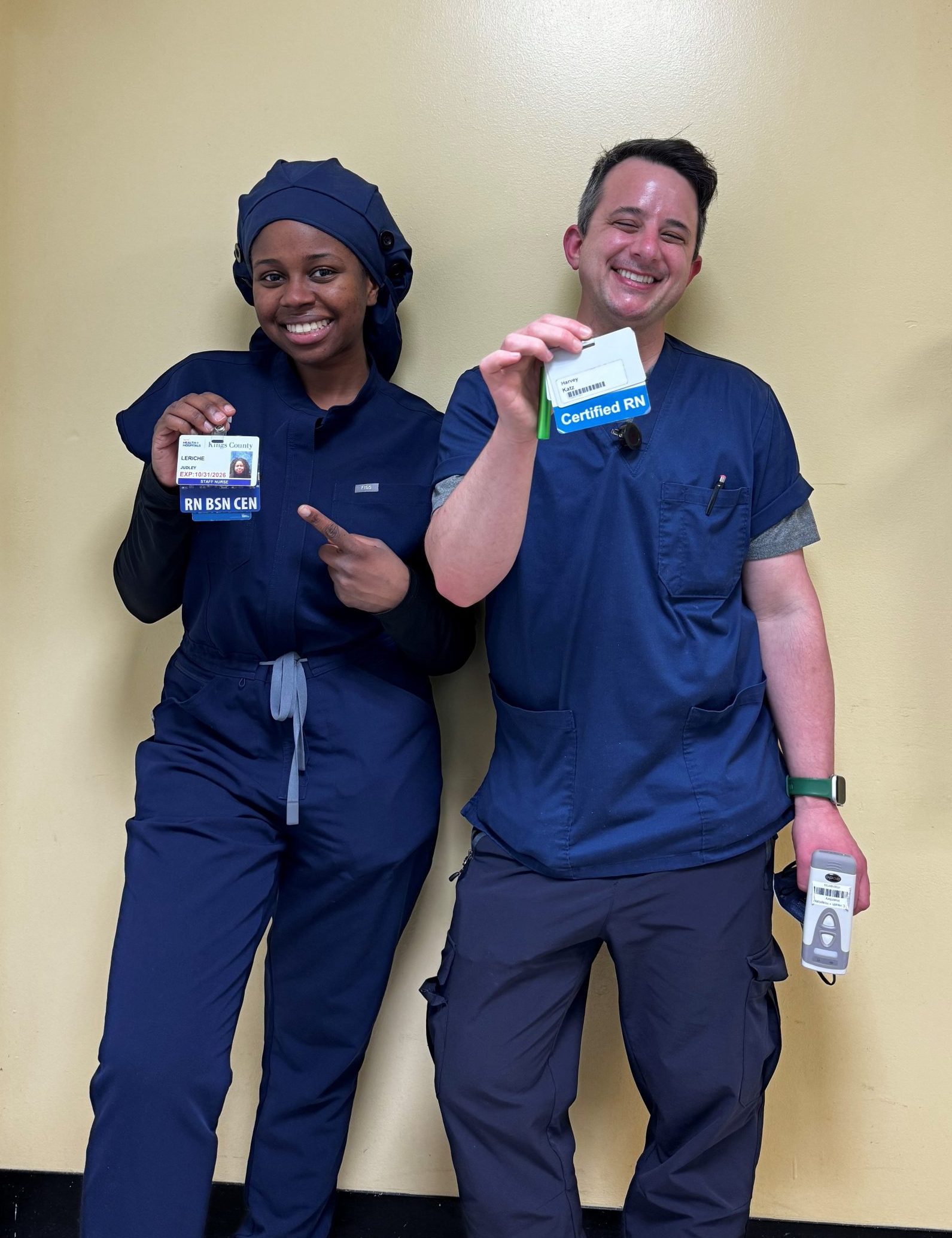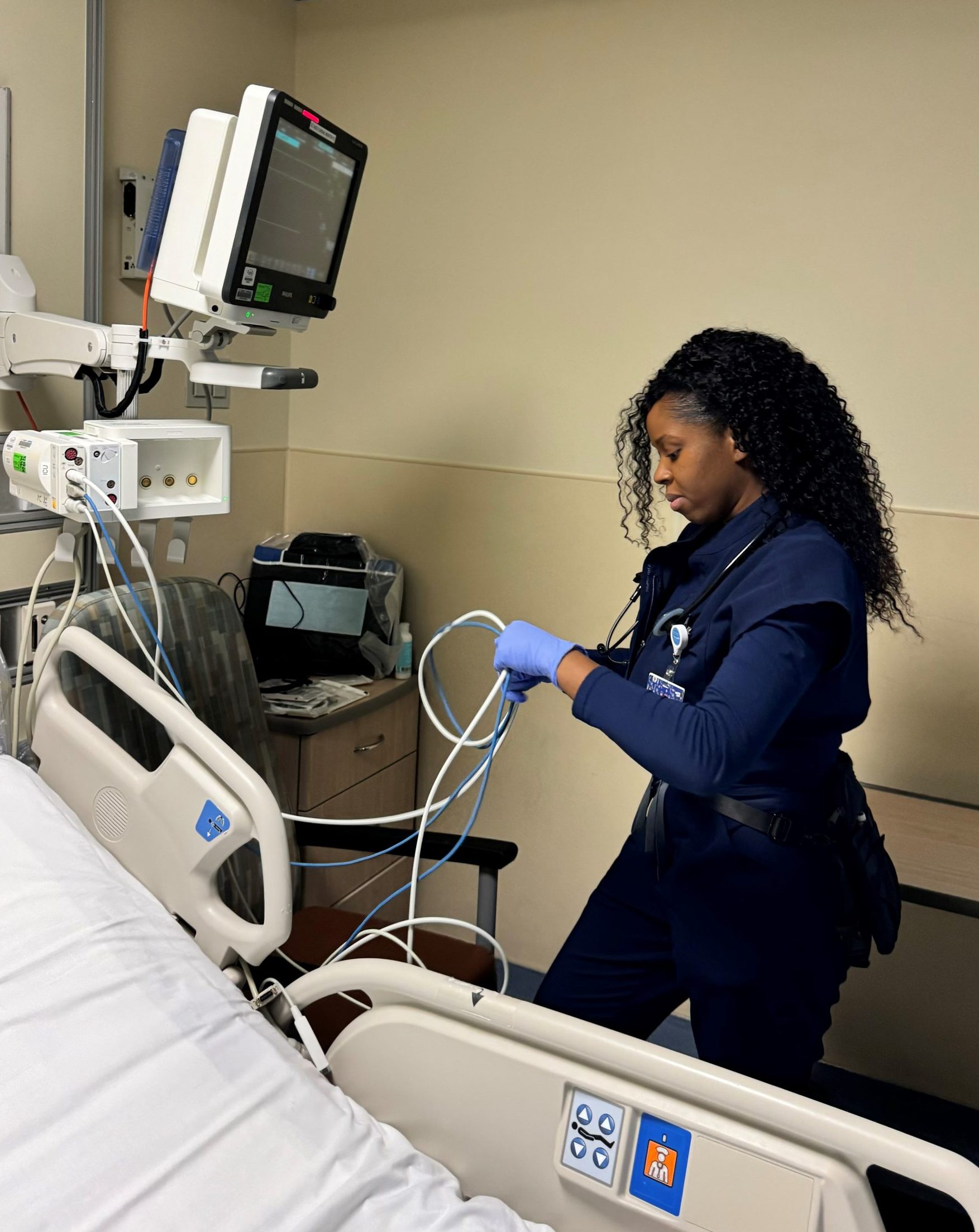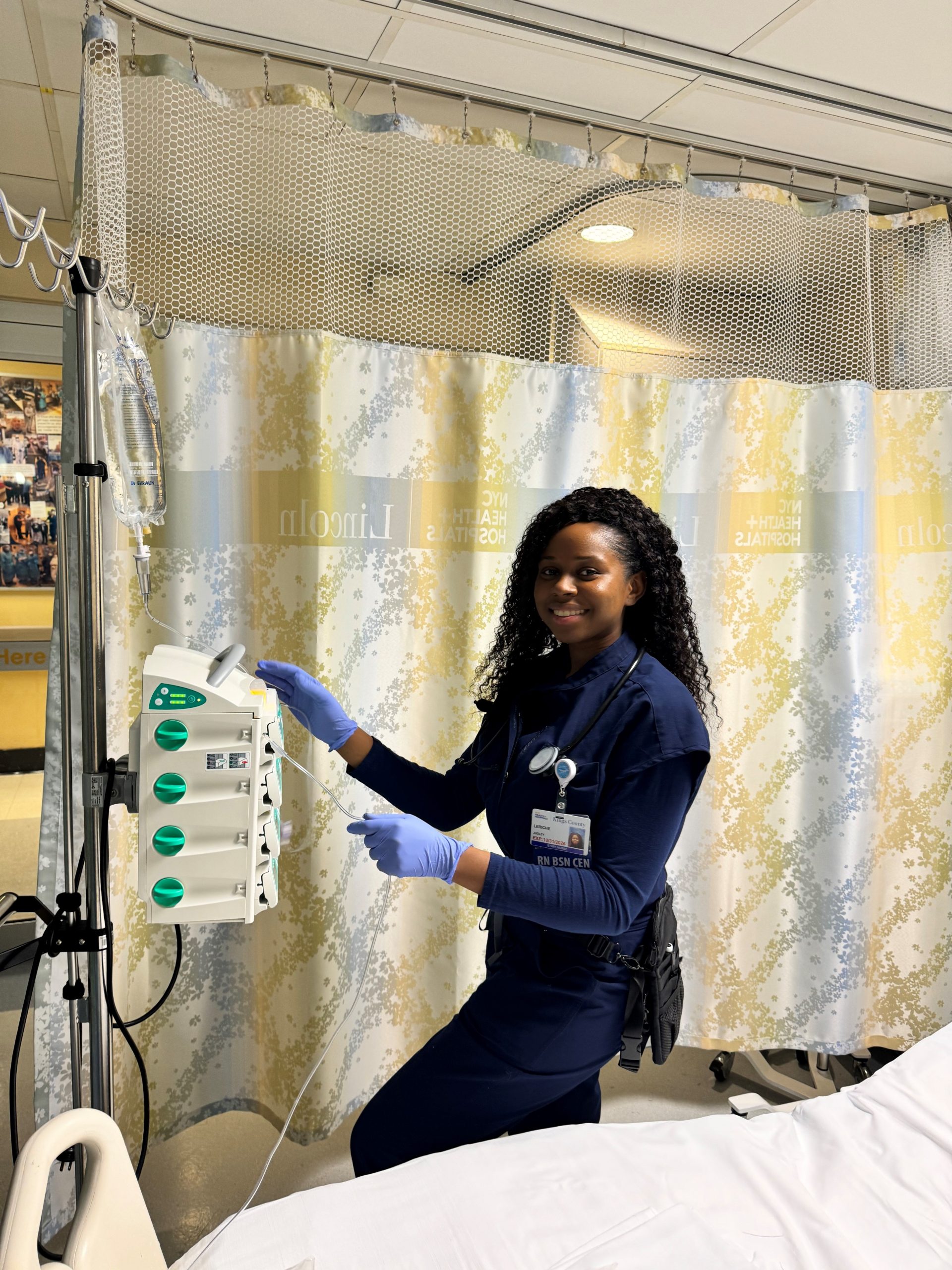
Our interview with Judley Leriche is the fourth installment of BCEN’s new “Certified Spark” series, and we’re proud to feature it in our newsletter, on bcen.org, and on BCEN’s social channels. Will your story be next? Tell us your Certified Spark story.
Since October 2021, Judley Leriche, BSN, RN, CEN, has worked as a staff nurse at NYC Health + Hospitals/Kings County Emergency Department, a Level I Trauma Center, in Brooklyn, New York. Like many nurses who graduated during the pandemic, her nursing school experience wasn’t quite what she expected. In fact, her first job after earning her associate degree in June 2020 was administering COVID tests, and later, vaccinations, while she continued her studies and earned her BSN from New York City College of Technology in June 2021.
Drawn to emergency nursing for its diversity of experiences, Judley’s first full-time nursing job after completing her BSN was in a busy, big city ED. With just over a year under her belt, she was inspired to get certified by a coworker, and in December 2023 she became a Certified Emergency Nurse (CEN).
We talked with Judley about her experiences as a new nurse in the ED, her advice for RNs considering specialty certification, and how being board certified has both changed her practice and how others regard her.
Embarking on a Nursing Career in the ED

First, we asked Judley to tell us how her nursing career started, why she wanted to be an ED nurse, and what, or who, inspired her to become a CEN.
Judley: Because I graduated during the pandemic, during my schooling I didn’t have a lot of chances for hands-on experience. We had to use virtual patients because we couldn’t go into the hospitals at that time. I was drawn to the ED because of the diverse skill set that you get to learn there, and because I was interested in getting critical care experience, it was recommended to me by one of my nursing professors. So I decided to apply and was hired in the ED as a new grad. This October, it will be three years.
In my emergency department, there were not a lot of nurses who were certified. During my orientation for the ED, which was part of a fellowship program, I also rotated through other units such as med-surg, where they talked a lot about being board certified. But I never really knew what that meant, and I only thought it was for that one specialty.
So when I came to the emergency room, there was a nurse named Harvey who was certified—a CEN, and being curious, I asked him what it meant to be certified. At that point, I still didn’t even know you could become specialized in emergency nursing. I noticed how Harvey was a role model for other nurses. He was so knowledgeable and resourceful, and I knew that was the kind of nurse I aspired to be. We got to talking about certification, and he really inspired me to go for it.
I’m Glad I Did It … Because I Was Ready
Preparing for a board certification exam can be a daunting task even for more seasoned nurses. So we asked Judley how she went about preparing for the CEN as a novice nurse.

Judley: I was always interested in excelling within my specialty and had joined professional organizations. I made the decision to take the exam after one year of being in the ER, but actually sitting down and taking it … that’s the part that was tricky.
I started studying in February 2023, and although I wasn’t as studious as I wanted to be at first, my goal was to take the exam by the end of the year. Then I started to study on my lunch breaks, and my colleagues would ask me what I was doing. When I told them I was going to sit for the CEN exam, they motivated me and encouraged me, telling me, “You’re going to do it. You’re such a great nurse. Just keep studying and keep going.”
I was going to take the exam in November, but when the time came, I didn’t feel ready. Looking back, my hesitation and feeling like I wasn’t 100% ready held me back from taking it sooner. But you’re never going to feel 100% ready to do things. Before I knew it, it was the last week of December, and having told myself I was going to take the exam before the end of the year, I scheduled the exam for December 29. On the day before the test, I was thinking maybe I should just push it off until next year. I think that part of me was still nervous and scared about it, even though I had been studying every day. But I wasn’t able to change the date, so I had to take it … and I’m glad I did, because looking back, I was ready.
Secrets to Exam Prep Success
Here’s Judley’s advice for test takers:
- Start studying sooner. A lot of the principles and knowledge I was learning as I studied for this exam helped me while I was working day-to-day. And because I was actually practicing what I was learning, it stuck with me more when it came to the exam.
- Have a solid plan. From the point when you decide that getting certified is something you want to do up until you start studying, create a study plan, stick with it, and set a test date.
- Lean on your community. One of the things that really helped was my community and having other nurses working in the ER whom I could rely on as resources, including nurses who had taken the CEN exam already, like Harvey. They shared resources with me and study materials. I’d also say doing research was very important, especially looking at the list of BCEN study references for the CEN. Throughout the time, I used the CEN exam content outline as my guide. We also had a group chat where we would do practice questions every day and discuss the rationales. That helped a lot. When it comes to being consistent, having accountability partners is important.
Specialty Certification for New(er) Nurses: Confidence, Enhanced Care & An Antidote to Imposter Syndrome
 Having experienced what’s involved with earning initial certification, we asked Judley if she thought aiming for specialty certification as a new nurse makes sense.
Having experienced what’s involved with earning initial certification, we asked Judley if she thought aiming for specialty certification as a new nurse makes sense.
Judley: Certification is something I would encourage new nurses to do for sure. Being certified in your specialty increases your confidence. It makes you a better provider for your patients. It enhances patient care. So I encourage it 100%. A lot of new nurses have imposter syndrome because we are new to this. But studying and taking the certification exam helps not only reassure others but also yourself that you have the knowledge, and you also know how to use it.
Part of nursing is lifelong learning. We don’t necessarily have to go back to school and get a master’s or a doctorate, which of course is great to do. But while we’re considering what we want to do next in our career, we can still take an active approach to learning that doesn’t necessarily have to involve getting a degree. Earning a specialty certification definitely sets you apart from others in your specialty. And it helps that organizations often have incentives for earning a certification.
A Good Foundation, A Different Level of Expertise
After nearly a year of studying and a several months as a CEN-certified nurse, Judley said she’s already noticing the difference being certified makes in her practice and her interactions with colleagues.
Judley: Since becoming a CEN, I have more confidence when it comes to my skills and how I approach patients and how I interact with doctors. I anticipate what type of care will be done for patients. I’m able to add input if I think there’s something that needs to be done. I feel like I’m better equipped to care for and advocate for my patients.
Being certified has improved my critical thinking skills and prioritizing different tasks. In the ED, time is always of the essence. Being a CEN has helped me become more efficient. I’ve become a resource for other RNs, too, which I really appreciate being able to do. And I’ve even started helping orient new nurses to the ED.
“Being certified sets a foundation and helps guide you on a path to where you are headed in your career.”
More Than Getting Initials
As our conversation came to a close, we asked Judley to look ahead and think about what certification might mean for her as she builds her career.
Judley: Having a certification early on in your career means you have a good foundation for having the confidence and skill sets you’ll need before going on to different roles, such as leadership or any other capacity where you will be a mentor for others. It helps with your career advancement by setting you apart and helping you network. It helps your career growth, your evidence-based practice and patient care, and your ability to do research.
Being certified is much more than initials. It shows you value learning and your professional career. It helps with whatever specialty you are in, and it makes a difference when it comes to going back to school. More than just getting the initials, the CEN represents how dedicated I am to acute care and providing care to people at such a critical time in their lives.
